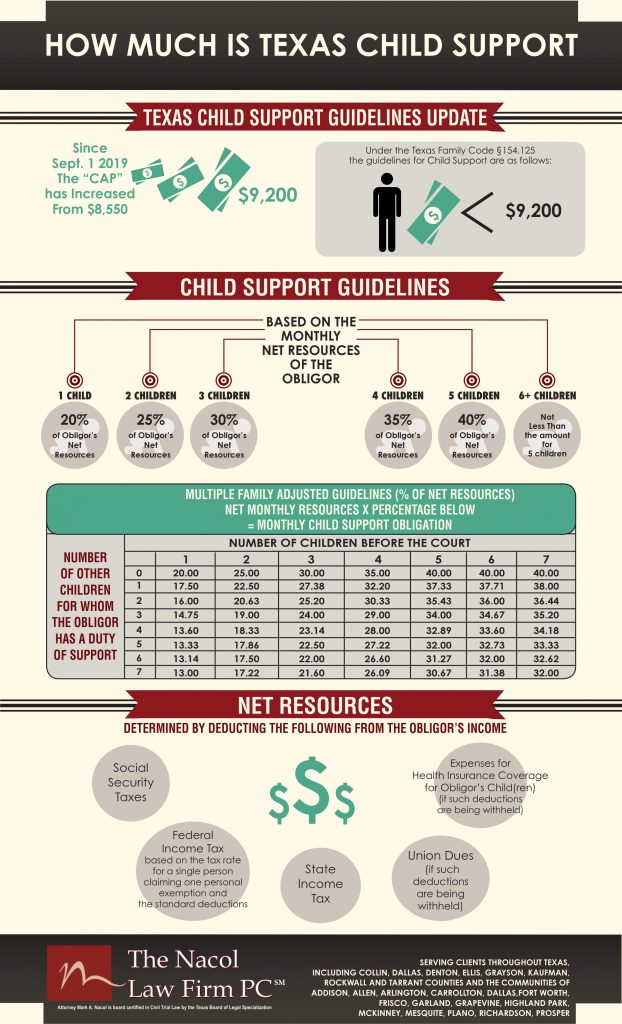How Much is Texas Child Support? Texas Child Support Guidelines
Effective September 1, 2019 The Texas Child Support Division of the Attorney General increased the Maximum child Support under the Texas Child Support Guidelines from $8,550 to the “new cap”of net monthly resources to $9200 annually. This change in the law will increase the amount of maximum child support from of $1,710.00 to $1,840.00 monthly (20% of $9200. For one child)
Texas Family Code §154.125(a)(1) requires that every six years the presumptive amount of net resources to which the child support guidelines apply shall be reviewed and adjusted for inflation by the Texas Office of the Texas Attorney General (OAG). That section sets out the formula for doing so based on the consumer price index. The last adjustment was done in 2013 when the current amount of $8550 per month was established.
How does the “cap” work and what could this mean for you? If your net monthly resources are less than $8,550, the child support obligation will not change on Sept. 1. You are under the “current cap” and lower than the “new cap”. All stays the same.
If you are currently going through litigation and your net monthly resources exceeds $8,550 and the Court orders child support prior to September 1, 2019, Texas Child Support Guidelines will mandate that the Court apply the appropriate child support percentage to the first $8,550 in net monthly resources based on the number of children. But, if the Court orders child support after September 1, 2019, it will apply the new appropriate child support percentage to the first $9,200 in net monthly resources.
Child support under the guidelines is determined by applying the applicable percentage, beginning at 20% for one child and increasing incrementally for each additional child, to the net resources amount. If a child support obligor has monthly net resources over $9200, a party seeking above the guideline’s child support has the burden of proving to the court that additional support should be ordered according to factors set out in Texas Family Code §154.126.
Important to Know: The new “cap” increase of September 1, 2019 will not automatically increase the obligor’s existing child support obligation. Any change in child support standing before September 1, 2019, can only occur through the court with a modification order to increase the child support to the new “Cap” amount of $9200. After September 1, 2019, any new suit for child support will be subject to the new “cap”.
Please review the Texas Office of the Texas Attorney General (OAG) website for a child support calculator for the new breakdown: https://csapps.oag.texas.gov/monthly-child-support-calculator

The Nacol Law Firm PC
8144 Walnut Hill Lane
Suite #1190
Dallas, Texas 75231
Nacollawfirm.com
Your 2023 Texas Holiday Visitation Schedule with your Children
Now is the time to review your 2032 Holiday Visitation Schedule with your children.
Here is a reminder of the current Texas Family Law Code’s Standard Possession Order for the 2023 Holidays.
Texas 2023 Family Law Code’s Standard Visitation Guidelines for Thanksgiving:
The possessory conservator or non-primary conservator shall have possession of the child in odd-numbered years, beginning at 6 p.m. on the day the child is dismissed from school before Thanksgiving and ending at 6 p.m. on the following Sunday, and the managing conservator shall have possession for the same period in even-numbered years; The Holiday schedule will always override the Thursday or Weekend schedules.
Texas Family Law Code’s Standard Visitation Guidelines for Christmas Break:
The possessory conservator or non-primary conservator shall have possession of the child in even numbered years beginning at 6 p.m. on the day the child is dismissed from school for the Christmas school vacation and ending at noon on December 28, and the managing conservator shall have possession for the same period in odd-numbered years.
The possessory conservator or non-primary conservator shall have possession of the child in even-numbered years beginning at noon on December 28 and ending at 6 p.m. on the day before school resumes after that vacation, and the managing conservator shall have possession for the same period in odd-numbered years; The Holiday schedule will always override the Thursday or Weekend schedules.
The Holiday Season should be a happy family time. Many times, emotional issues from the result of the break-up affects a family which causes the joy of the season to be overshadowed by unhappiness and despair! Children need to have structure in their Holiday Visitation Schedule to ensure that they will be able to see both parents and share the joy of the season with their entire family. The children are often the ones who suffer when the Holiday Visitation arrangement goes awry.
Unfortunately, many parents may wait too long to confirm visitation plans for this upcoming holiday season. If you cannot reach an agreement regarding visitation or believe you may be deprived of holiday visitation by the other parent, now is the time to contact an attorney. Time is short and Courts are already starting to overload with future visitation problems for the 2023 Holiday Season.
The best gift a child can experience for the Holiday Season is an early proactive arrangement of all holiday plans between both parents. Everyone needs to know dates and times for visitation with both Mom and Dad. This Holiday Season vow to keep your child out of the middle of any family conflict and start to develop new holiday traditions with your child and family. Many parents have new relationships/marriages and other children in the family group. The new holiday traditions should include everyone and be a bonding experience for years to come.
Call Us. We Can Help!
Nacol Law Firm P.C.
Dallas Fathers Rights Attorneys
(972) 690-3333
How to Co-Parent with a Narcissist …And Live Through It!
You are finally divorced from your Narcissistic Spouse! Now you are embarking on your new family situation with your Narcissist Ex: Co- Parenting! You are probably wondering how you became the lucky person who gets to experience this mind-altering situation along with other people you love the most: your children!
Let’s review what is Narcissistic Personality Disorder or ‘NPD”? It is a mental disorder where the person has a very transparent and superficial inflated self-esteem and neurotic needs for admiration and special treatment from other people. Typical arrogant behavior and lack of empathy for other people causes many problems in all emotional areas of their lives and relationships. Narcissists are usually very aggressive with impulsive tendencies, dangerous lifestyles involving cockiness, selfishness, manipulation and power motives. These individuals may appear as very exciting personalities at first meeting, but at the end of the day are unfulfilling and destructive. This false sense of entitlement produces a feeling that causes them to punish those who do not provide their required respect, admiration, or attention.
One of the biggest personal disappointments in Co-Parenting with your Narcissistic Ex is that often you are as unsuccessful as you were in marriage with the ex-spouse.
Children cannot and do not offer the continuous positive feedback narcissist parents crave and the parent will often react in one of two ways. W. Keith Campbell, an expert on narcissism and professor of psychology at The University of Georgia, offers that “some lose interest in their children entirely and look for other sources of validation”. “Others view their children as a reflection of themselves and become hyper-involved and controlling. Disconnection is the key, even an overly narcissistic parent is emotionally detached and lacks warmth.”
Eminent psychologist E. Mavis Hetherington In her landmark book, For Better or For Worse, highlights the results of her study of 1,400 families and the importance of examining the type of conflict children experience. She notes high conflict that involves the child is physically violence, threatening or abusive conduct and conflict in which the child feels caught in the middle, causing the most adverse consequences for children. These effects include anxiety, depression, and low self-esteem.
Some Strategies when dealing with Co-Parenting with your Narcissist Ex
- Limit your contact with your Ex. Contact should only involve information or issues concerning your children. Email or Text as much as possible. When you have the child, make the rule, “Unless an emergency, no contact will be made verbally until the child goes with the other parent. Try not to talk directly to the other parent when the children are present.
- Don’t Respond immediately or to everything (Hold that trigger response when children are present!) Also commit to a 24-hour turn around on all communications to and from your Ex!
- Make sure that you have a structured parenting plan in place that is very specific concerning schedules of visitation, holidays and vacations to help to minimize conflict. Also, if necessary, secure the help of professional counselors, lawyers, or therapists who can help the children and yourself to cope with the Narcissist Parent.
- Control your behavior and your triggers! Your ex-spouse knows you very well and knows how to press a trigger to make you look like the “Crazy “parent. This situation was continuous during the marriage and has continued in your Co-Parenting period. You are the adult and your children are watching your behavior concerning how they react to their other parent.
- Be the PARENTAL ROLE MODEL for your children. Show your children through your actions that you only have their best interest as your top priority. Control your behavior toward your narcissist ex and never bad mouth the other parent in front of the children.
- Do not tolerate abusive/demeaning behavior from your Ex to either you or your children. You must be the “adult” and protect your children. If your children are afraid to go visit this parent or after a visit, the kids come back with bruises, breaks or a more serious medical problem, get professional help to stop this type of abuse. If you truly feel that this narcissist parent is abusing the child, do not continue to send the child back to this parent. Contact an attorney who can help you to keep your child safe.
- Last by not least do not care what other people think! This is your life and you are the only parent who can control and protect your child against the Narcissist Parent. Life is hard and people are not perfect. When your children grow up and are responsible parents, this will be your award for being there to care and protect them from parental harm.
The Nacol Law Firm P.C.
Father’s Access and Possession of Their Children: A Father’s Absence can be Disastrous to his Children’s Lives
There is now a discernible shift in the United States concerning Fathers Rights. A new legal awareness in many state family courts is leaning towards both parents need to be involved in raising a normal loving child. Mom and Dad may not be able to live as a couple, but the child deserves to have both parents in his/her life. Many legal professionals in the United States are working on changing old antiquated strict ideas on the parental foundation structure of the family. Ideas on raising children, even in a broken family, need to include both Dad and Mom.
According to the National Center for Fathering, “More than 20 million children live in a home without the physical presence of a father. Millions more have dads who are physically present, but emotionally absent. If it were classified as a disease, fatherlessness would be an epidemic worthy of attention as a national emergency.”
“Psychology Today” researchers have found this statement to be true. The results of father absence in their children’s lives can be disastrous. Specific behavior for many of these children are:
- Children’s diminished self-concept, and compromised physical and emotional security
- Behavioral problems (fatherless children have more difficulties with social adjustment, and are more likely to report problems with friendships, and manifest behavior problems)
- Truancy and poor academic performance (71% of high school dropouts are fatherless; fatherless children have more trouble academically, scoring poorly on tests of reading, mathematics, and thinking skills.
- Delinquency and youth crime, including violent crime (85% of youth in prison have an absent father; fatherless children are more likely to offend and go to jail as adults)
- Promiscuity and teen pregnancy
- Drug and alcohol abuse
- Homelessness (90% of runaway children have an absent father)
- Exploitation, A, and emotional maltreatment
- Physical health problems and Mental health disorders
- Life chances and future relationships
- Mortality (fatherless children are more likely to die as children, and live an average of four years less over the lifespan)
“When fathers are actively involved with their children, children do better, states Dr. Paul Amato, noted parent-child relationship sociologist at Pennsylvania State University. “Research suggests that fathers are very important for a child’s development”. The “Fathers Effect” is the term for the benefits of the paternal presence. These effects are numerous when fathers actively participate in family life. Minimum time must be spent together, but quality of time is more important than quantity of time”.
Fatherhood trends in America are changing! With the increase in the number of mothers who have now entered the job market, more fathers have started taking a more active role in caring for their children as single fathers are significantly growing in numbers. Pew Research has come out with new facts on American Dads and here are their key findings:
- More dads are staying home to care for their children
- 57% of fathers see parenting as central to their identity with 54% find parenting rewarding all the time.
- Work-family balance is a challenge to balance work and family life. 52% of working dads say it is very or somewhat difficult to do so.
- 74% of men face major pressure to support their families financially, while 49% face pressure to be involved parents.
- It has become less common for dads to be the family’s sole breadwinner.
- Fathers are much more involved in childcare. But in caregiving mothers are still view as the primary parent.
- 63% of fathers still feel they spend too little time with their children usually because of work obligations.
In the future it may be possible for 50/50 joint custody and co-parenting with both parents to be the legal presumption and the norm for presumed access and possession of Divorce or Mediation Orders. Divorce is never blameless, but raising a child is where parents must raise above their personal feelings and think of what is best for the child.
Nacol Law Firm P.C.
Fathers Rights Attorneys
Dallas TX
(972) 690-3333






